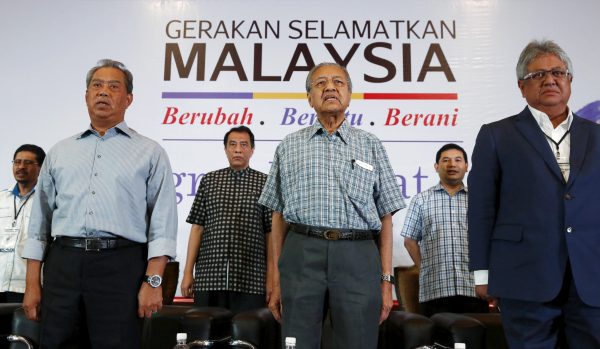Mahathir now frequently shares the stage with the regime opponents he jailed during his 22 years in power. He made appearances at the rally of the pro-democracy group Bersih and even showed up at the opposition Democratic Action Party’s congress, saying his previous views on the party were wrong.
Yet Mahathir is not the only unlikely new opposition. Former deputy prime minister Muhyiddin and Mahathir’s son Mukhriz have joined up with Mahathir after both were fired from the ruling United Malays National Organisation (UMNO) party. These ‘three Ms’ now head a new political party — the United Indigenous Party of Malaysia (Parti Pribumi Bersatu Malaysia). A number of prominent UMNO leaders at the state level, including UMNO Sabah’s Shafie Apdal, have left the party, signalling simmering internal discontent.
All of this is evidence of how the enormous 1Malaysia Development Berhad (1MDB) corruption scandal continues to reshape Malaysian politics. Prime Minister Najib Razak has squashed domestic investigations that might definitively link him to the billions of dollars missing from the state investment fund 1MDB. But international investigations in the United States, Switzerland, Singapore and elsewhere will likely result in more damaging and difficult-to-deny revelations.
These defections should be a major source of worry for Najib’s government. Scholars of competitive authoritarian regimes like Malaysia have long noted the key role of regime defectors in encouraging regime collapse.
Yet there are a few reasons why Najib’s position seems temporarily secure — not least because of the powerful authoritarian tools he inherited from Mahathir. Perceived regime opponents have been sued, attacked and detained. The Red Shirt group — led by UMNO division leader Jamal Yunos — have repeatedly threatened and attacked organisers of the Bersih protests. After their November rally in Kuala Lumpur, Bersih organiser Maria Chin Abudllah was detained for 11 days in solitary confinement. Independent media has suffered from website blocks, raids and criminal charges.
In another major realignment, Najib has slowly drawn in the Islamic opposition Pan-Malaysian Islamic Party (PAS). He pledged support for the controversial bill championed by PAS President Hadi Awang, which is widely seen as laying the groundwork for hudud (Islamic criminal law) implementation in Malaysia. In early December, Najib and Hadi shared the stage at a rally to highlight the plight of the Muslim Rohingnya community of Myanmar.
At the international level, Najib has found a welcome new partner in China. China has snapped up 1MDB’s assets at rock-bottom prices, and may help the company pay for its legal disputes in exchange for government land. There has been a series of high-profile Chinese investments in the East Coast Rail, real estate development in Malacca and Johor Bahru, and around the high-speed rail line between Kuala Lumpur and Singapore. Najib enthusiastically greeted Trump’s election in the United States, but it is unclear whether the change in government will affect the Department of Justice’s investigation into 1MDB.
The next general elections are likely to take place in 2017, which places electoral manoeuvring at the top of all parties’ agendas. Opposition leaders hope high-profile defectors like Mahathir and his new party can help make unprecedented inroads into government territory. But the warming ties between PAS and UMNO will significantly complicate the opposition’s problems of divvying up seats and presenting a united image to voters. Najib — and UMNO — still have access to enormous state resources, control over the elections process and an array of authoritarian tools that will greatly aid them in retaining power.
Yet as elections loom, the more fundamental issues around Malaysia’s politics are being sidelined. Who or what comes after Najib? There is little sign that Najib’s ouster will trigger the protracted institutional reform needed to prevent future abuses of power. The party he leads has shown little evidence of soul-searching over the scandal.
It is also unclear how willing the new opposition leaders are to stay outside the ruling government if and when Najib leaves power. At the least their style of politics seems an uneasy match with the multiracial and progressive image cultivated by the opposition Pakatan Harapan coalition. Mahathir’s race-based Malaysian United Indigenous Party, or PPBM, unapologetically harkens back to a racial paradigm of politics, seeking to sweep up discontented UMNO leaders and supporters. As a result, the newly expanded opposition is left with antipathy to Najib as their major unifying issue.
Malaysia has entered a new and potentially dangerous chapter in its political history. At this point, it seems the opposition can only raise the stakes for Najib to further erode democratic institutions in a bid to keep his party — and himself — in power.
Sebastian Dettman is a PhD candidate in the Department of Government, Cornell University.
This article is part of an EAF special feature series on 2016 in review and the year ahead.

